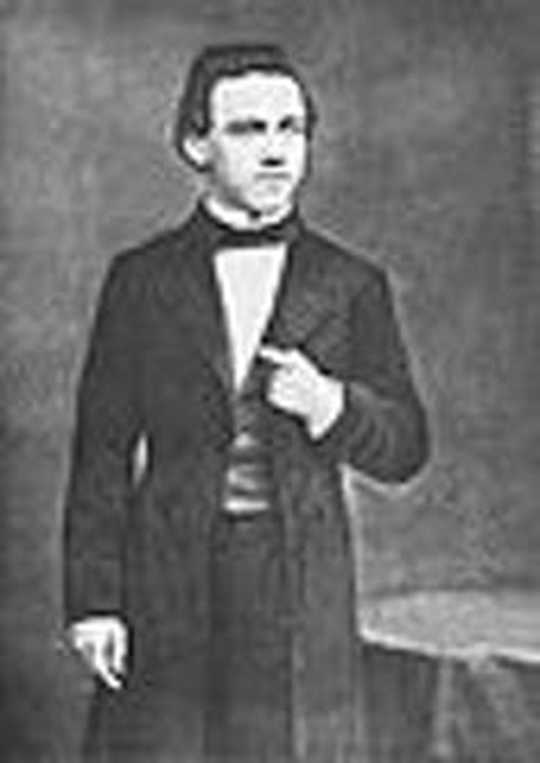 Legal battles require the same skills seen at the highest levels of chess. Elnur/Shutterstock.com
Legal battles require the same skills seen at the highest levels of chess. Elnur/Shutterstock.com
Paul Morphy was a 19th-century New Orleans chess prodigy who was the de facto world chess champion during much of his short life. He rarely lost when he played throughout Europe and the United States. He was also a lawyer who graduated from what is now Tulane Law School. As a student, he was said to have memorized the Louisiana Civil Code in English and French.
 Paul Morphy in New York in 1859. WikiMedia Commons
Paul Morphy in New York in 1859. WikiMedia Commons
His father was a prominent Louisiana judge.
There are other talented chess-playing lawyers, though none, in my view, as brilliant at chess as Morphy. Three 20th century champions all agree that Morphy was among the greatest chess players of any era.
The general view is that he would have the chess grandmaster title, the highest title in the world of chess, if he were alive today.
As a law professor and high-level amateur player, I believe that playing chess is great training to be a successful law student and lawyer. Here are five reasons why.
1. Intellectually rigorous
Much like law school, chess is intellectually rigorous. Playing chess at the highest level is so hard that Microsoft founder Bill Gates lost after only nine moves in an exhibition blitz game with the current world champion, Norwegian Grandmaster Magnus Carlsen. One might have expected Gates to last longer given his genius.
A chess player must concentrate for as many as five or six hours in serious tournaments, and a single lapse can cause a loss. Learning to concentrate is also invaluable for law school.
Aspiring law students often take undergraduate classes that are part of a “pre-law” program. Government or criminal justice majors are typical since they involve some focus on the legal system. These are important intellectual fields.
Yet, informal studies suggest that students who major in especially difficult areas, such as philosophy or mathematics, perform better on the LSAT – the exam required for entrance into law school. Just as math and logic serve lawyers well in the courtroom as they fashion their arguments, so, too, is it with chess players on the chessboard as they make their moves.
2. Requires identifying issues
Students who perform well on law school exams and the bar exam must succeed at “issue spotting.” That is to say, unlike undergraduate exams, which may require the student to summarize what they have learned, law school exams require students to figure out what legal issues are buried within the facts of a given case. Then the student should apply the right legal principles to the facts. The student often must draw analogies and see patterns. Lawyers must also spot issues and draw analogies when their clients present problems.
Similarly, good chess players survey the chess board, with a clock ticking, and must find a strong move among many possible candidate moves. They will look for patterns, such as typical methods of attacking a king. Sometimes, the move will be a tactical strike, such as the bold sacrifice of a queen leading to checkmate. Those players who cannot see many possibilities will not win many games. Both the chess player and lawyer must discover the key aspects of a situation.
3. Strategies essential
Strong performance in law and chess involves strategizing effectively. Chess may therefore be law’s most common metaphor.
Success requires the ability to plan, envision how one’s opponent will respond, and then figure out how to reply. As a former litigator, I not only had to think about what to do, but I also had to assess whether my adversary would have an effective contrary plan. I also had to know the weaknesses in my case. Similarly, a strong chess player will know the problems in their position.
4. Principles and rules apply
Both law and chess have rules, general principles, and exceptions or loopholes. The law is often codified as a statute. Likewise, chess has rules, though they often lack the ambiguity of statutes. Beginning chess players then learn accepted principles. For instance, they are taught that during the opening part of the game, they should get certain pieces into play, use those pieces and pawns to control the center of the board, place their prized king in a safe position by making a special move known as “castling,” and keep moves by their valuable queen in reserve. Yet strong chess players may violate these principles, for surprise or other purposes.
Prosecutors also have common approaches. In criminal cases with multiple defendants, prosecutors are trained to go after the “small fish” first, and then use those successes to land the “big fish.” This is like capturing the pawns before checkmating the king in chess. The press even uses these chess terms in describing criminal cases.
5. Takes competitive zeal
Success in both law and chess requires competitive instincts. Indeed, chess has a rating system for players and law school has class rank for students. Chess requires a will to win strong enough to maintain concentration.
Chess players often experience ups and downs during single games, as well as tournaments. They must cope with adversity, including losing. Similarly, a single law school exam can be the only basis for the student’s class grade, so everything is at stake at once, though the student has likely worked all semester. Lawsuits can also take years and require persistence. My cases and trials were always roller coasters with good and bad days.
Another similarity is that the chess player and lawyer must be well prepared. In chess, one can often find an opponent’s games online and see their playing style. In law, one can learn about the judge who will be hearing a case and alter one’s approach accordingly.
Admittedly chess is just a game so most people play it for fun, whereas practicing law is a profession. Few chess players will reach the heights of Paul Morphy. Nevertheless, as one who has played chess at high levels and litigated federal and state court cases, I believe that chess develops important intellectual, emotional and competitive skills that are very useful in the legal field.
About the Author
Mark Kende, Professor of Law, Drake University
This article is republished from The Conversation under a Creative Commons license. Read the original article.
Books on Improving Performance from Amazon's Best Sellers list
"Peak: Secrets from the New Science of Expertise"
by Anders Ericsson and Robert Pool
In this book, the authors draw on their research in the field of expertise to provide insights into how anyone can improve their performance in any area of life. The book offers practical strategies for developing skills and achieving mastery, with a focus on deliberate practice and feedback.
Click for more info or to order
"Atomic Habits: An Easy & Proven Way to Build Good Habits & Break Bad Ones"
by James Clear
This book offers practical strategies for building good habits and breaking bad ones, with a focus on small changes that can lead to big results. The book draws on scientific research and real-world examples to provide actionable advice for anyone looking to improve their habits and achieve success.
Click for more info or to order
"Mindset: The New Psychology of Success"
by Carol S. Dweck
In this book, Carol Dweck explores the concept of mindset and how it can impact our performance and success in life. The book offers insights into the difference between a fixed mindset and a growth mindset, and provides practical strategies for developing a growth mindset and achieving greater success.
Click for more info or to order
"The Power of Habit: Why We Do What We Do in Life and Business"
by Charles Duhigg
In this book, Charles Duhigg explores the science behind habit formation and how it can be used to improve our performance in all areas of life. The book offers practical strategies for developing good habits, breaking bad ones, and creating lasting change.
Click for more info or to order
"Smarter Faster Better: The Secrets of Being Productive in Life and Business"
by Charles Duhigg
In this book, Charles Duhigg explores the science of productivity and how it can be used to improve our performance in all areas of life. The book draws on real-world examples and research to provide practical advice for achieving greater productivity and success.






















